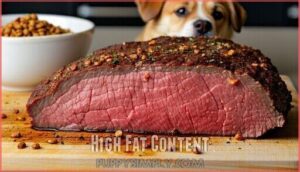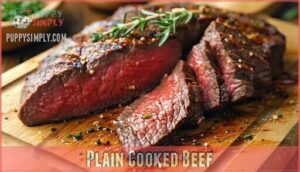This site is supported by our readers. We may earn a commission, at no cost to you, if you purchase through links.
 You shouldn’t give your dog corned beef, even though those puppy eyes might be hard to resist.
You shouldn’t give your dog corned beef, even though those puppy eyes might be hard to resist.
Can dogs eat corned beef? Technically yes, but it’s like offering candy to a diabetic – not a good idea.
This processed meat packs a sodium punch that’s roughly ten times what’s safe for dogs, plus nitrates and preservatives that spell trouble.
Even small amounts can trigger vomiting, excessive thirst, and diarrhea.
Larger portions risk salt poisoning, which is no joke.
Your pup’s kidneys weren’t designed to handle this salty assault.
Smart dog parents know there’s more to this story than meets the eye.
Table Of Contents
- Key Takeaways
- Corned Beef Overview
- Can Dogs Eat Corned Beef
- Risks of Corned Beef
- Safe Alternatives for Dogs
- What Happens if Dogs Eat Corned Beef
- Feeding Dogs Safely
- Preventing Corned Beef Risks
- Frequently Asked Questions (FAQs)
- Is corned beef bad for dogs?
- Can dogs eat corned beef brisket?
- What is corned beef?
- Can dogs eat corned beef bones?
- Can dogs eat corned beef & cabbage?
- Is it okay to feed my dog corned beef?
- What canned meat is safe for dogs?
- Can dogs eat canned tuna?
- Is canned corn safe for dogs?
- How much corned beef can a dog eat?
- Conclusion
Key Takeaways
- Don’t feed your dog corned beef – it’s loaded with dangerous sodium levels that can cause salt poisoning, dehydration, and serious kidney problems, even in small amounts.
- Watch for warning signs if your dog accidentally eats corned beef, including excessive thirst, vomiting, diarrhea, and lethargy, which require immediate veterinary attention.
- Choose safer protein alternatives like plain cooked beef without seasonings, canned poultry in water, or vet-approved dog treats that won’t harm your pet’s health.
- Always read labels on processed meats and avoid foods with garlic, onions, high sodium content, or preservatives that are toxic to dogs and can cause long-term health issues.
Corned Beef Overview
Corned beef is a salt-cured meat made from beef brisket that’s brined with saltwater, spices, and preservatives, making it a far cry from the plain beef your dog might safely enjoy.
While you might love this St. Patrick’s Day staple, the high sodium content and added ingredients create serious health risks that make it unsuitable for your furry friend.
Your St. Patrick’s Day feast might be delicious, but that salty corned beef could send your pup straight to the vet!
Origins and Preparation
From humble beginnings to holiday tables, corned beef starts with beef brisket, a tough cut from the cow’s chest.
The curing process transforms this meat through brining with saltwater, sugar, and spice blends.
Historical methods used dry salt, but modern meat preservation relies on wet brining.
Salt importance can’t be overstated—it’s what makes corned beef distinctive.
The process of transforming the beef is crucial, and the use of brining is a key factor in this transformation.
Nutritional Content
Corned beef packs impressive nutritional value with 15.5 grams of protein per 3-ounce serving, plus essential vitamins like B12 and minerals including iron and selenium.
However, it’s also loaded with concerning fat content at 16.2 grams and sky-high sodium levels reaching 827 milligrams.
While beef nutrients sound appealing, these mineral sources come with serious drawbacks for your dog’s health.
Risks for Dogs
While corned beef might smell delicious to your furry friend, it’s packed with hidden dangers that can seriously harm their health.
The sky-high sodium content creates a perfect storm for multiple health complications.
Here’s what makes corned beef risky for dogs:
- Salt poisoning from excessive sodium levels can cause dehydration and neurological symptoms
- Pancreatitis risk increases due to high fat content, potentially becoming life-threatening
- Toxic additives like garlic and spices can damage your dog’s system
- Heart problems and kidney damage develop from prolonged exposure to harmful ingredients
Certain breeds, like the French Bulldog, are also prone to health issues, so consider dietary needs carefully.
Can Dogs Eat Corned Beef
The short answer is no, dogs shouldn’t eat corned beef.
While it’s not technically poisonous, this popular deli meat poses serious health risks for your furry friend.
The high sodium content and harmful ingredients make it a poor choice for canine consumption.
| Safety Factor | Corned Beef | Safe Alternative |
|---|---|---|
| Sodium Content | Extremely High | Plain Cooked Beef |
| Fat Levels | Very High | Lean Chicken Breast |
| Additives | Garlic, Spices | Vet-Approved Treats |
Unlike safe meats designed for dogs, corned beef contains dangerous levels of sodium that can lead to sodium toxicity.
A single serving often exceeds your dog’s daily sodium needs by 300%.
The brining process adds toxic foods like garlic and excessive salt, creating holiday dangers during celebrations.
If your dog has a beef allergy, corned beef compounds the problem with additional harmful ingredients.
Instead, choose treat alternatives like plain, unseasoned beef or commercial dog treats.
These safe meats provide nutrition without compromising dog health through excessive sodium content and dangerous additives.
Risks of Corned Beef
While you might think sharing your St. Patrick’s Day corned beef with your furry friend shows love, this salty treat can actually harm your dog’s health.
Corned beef contains dangerous levels of sodium, unhealthy fats, and toxic additives that can lead to serious complications, from dehydration to life-threatening salt poisoning.
Excessive Salt Intake
Your dog’s kidneys weren’t built to handle corned beef’s massive sodium content.
Your pup’s system simply can’t cope with corned beef’s dangerous salt overload.
A single serving packs over 800mg of salt—that’s like your pup chugging seawater.
Your dog eating corned beef is like letting them drink from a salt shaker—dangerous and unnecessary.
This sodium overload disrupts water balance, triggering dehydration risks and spiking blood pressure.
Salt toxicity becomes a real threat, potentially overwhelming kidney function and creating dangerous health complications you’ll want to avoid, due to salt toxicity.
High Fat Content
Beyond salt concerns, corned beef’s high fat content poses serious digestive upset risks for your dog.
This fatty meat can trigger pancreatitis, a painful inflammation requiring emergency vet care. The excessive fat also leads to weight gain over time, creating long-term dietary concerns.
Your dog’s system struggles with fat absorption from processed meats, making regular dog food a much safer choice.
Some breeds, like the French Bulldog, are prone to allergies, so a high-quality diet is important, similar to the dietary needs of a sable French bulldog.
Harmful Additives
Beyond salt, corned beef often harbors synthetic preservatives and toxic spices that spell trouble for your furry friend.
These additives create a perfect storm of potential health hazards.
Here’s what lurks in that tempting meat:
- Sodium nitrates – preservatives that can harm your dog’s system
- Garlic and onion – toxic spices causing serious health issues
- Added sugars – unnecessary ingredients disrupting digestion
- Artificial flavors – chemical additives triggering stomach upset
Due to the high salt content, corned beef can lead to dehydration and other health problems in dogs.
Safe Alternatives for Dogs
You don’t need to deprive your dog of tasty protein treats just because corned beef is off the menu.
Several safer alternatives can satisfy your pup’s cravings while keeping their health intact, and most are probably already sitting in your kitchen.
Plain Cooked Beef
Unlike processed corned beef, plain cooked beef offers excellent protein for dogs when prepared correctly.
You’ll want to choose lean cuts and avoid all seasonings—no salt, garlic, or spices that could harm your pup.
Grilling, boiling, or baking works best for cooking methods.
Many owners find cooked beef products suitable for their pets.
Watch portion sizes based on your dog’s weight, and remember some dogs have beef allergies, so introduce it gradually into their diet.
Canned Poultry
Canned poultry offers another safe alternative to corned beef for your dog’s diet.
When selecting canned chicken or turkey, choose brands with only meat and water—no added salt, garlic, or preservatives.
These options provide excellent nutritional value with proper serving size control.
Always check labels for potential allergy concerns, as some dogs react to specific poultry proteins in human food preparations, which can be a significant allergy concern.
Vet-Approved Treats
Why settle for risky human food when vet-approved treats offer safer nutrition?
These specially formulated options support your dog’s health without hidden dangers like excessive sodium or harmful additives.
- Training rewards with limited ingredients for sensitive stomachs
- Dental chews that promote oral health while satisfying chewing instincts
- Allergy options designed for dogs with specific dietary restrictions
- Homemade recipes recommended by veterinarians for superior pet nutrition
For superior health, consider low calorie ingredients in your dog’s treats.
What Happens if Dogs Eat Corned Beef
When your dog sneaks a bite of corned beef, you’ll likely notice increased thirst and frequent trips to the water bowl within hours.
The high sodium content can trigger salt poisoning symptoms like vomiting, diarrhea, and dehydration, while the excessive fat may cause stomach upset or even pancreatitis.
Salt Poisoning Symptoms
Salt poisoning symptoms develop quickly after your dog consumes too much sodium.
Watch for excessive thirst and increased urination as early warning signs. Vomiting and diarrhea often follow within hours.
Neurological signs like tremors, confusion, or seizures indicate severe sodium ion poisoning. These pet poisoning symptoms require immediate intervention—don’t wait to contact your veterinarian.
Prevention includes limiting saltwater ingestion at the beach and providing fresh water.
Digestive Issues
Beyond neurological symptoms, your dog’s digestive system takes a serious hit from corned beef’s fat overload.
The high fat content triggers pancreatitis risk, while excessive sodium causes gut inflammation.
You’ll likely notice vomiting signs and diarrhea causes within hours.
These gastrointestinal issues stress your pet’s digestive system, creating uncomfortable digestive upset that can linger for days.
Spoiled food can introduce harmful bacteria and toxins into their system, leading to further gastrointestinal issues and digestive upset.
Long-Term Health Risks
Beyond immediate digestive upset, regular corned beef consumption creates serious long-term threats to your dog’s health.
The excessive sodium content substantially increases risks of kidney damage and heart disease, while high fat levels promote obesity risks and pancreatitis threat.
These compounding health issues can lead to lifespan reduction, making corned beef a dangerous choice for your pet’s future wellbeing.
Feeding Dogs Safely
When you’re considering any human food for your dog, you need to read labels carefully and control portions to protect their health.
Even foods that seem harmless can contain hidden ingredients or excessive amounts of salt, fat, and preservatives that can make your furry friend sick, which is why it’s crucial to be aware of what you’re feeding them, emphasizing the importance of carefully managing their diet.
Checking Labels
Reading labels becomes your first line of defense when considering any processed meat for your pup.
Smart pet owners know that scrutinizing sodium content and fat percentage can save their dog’s health. Checking dog food ingredients is also essential for your pet’s well-being.
- Sodium Content – Look for under 300mg per serving
- Toxic Ingredients – Avoid garlic, onion, and added spices
- Fat Percentage – Choose options below 10% fat
- Preservatives Analysis – Skip nitrates and artificial additives
Portion Control
When portion control matters most, even tiny amounts of corned beef can spell trouble for your furry friend.
A single ounce contains dangerous sodium levels that exceed safe daily limits for most dogs.
| Dog Size | Safe Amounts (Max) | Serving Frequency |
|---|---|---|
| Small (under 25 lbs) | None recommended | Never |
| Medium (25-60 lbs) | Tiny taste only | Rarely |
| Large (over 60 lbs) | Small piece | Occasional treat |
Skip corned beef entirely—your dog’s health depends on it.
Proper feeding requires careful food measuring to avoid overfeeding.
Hydration
Proper hydration becomes your dog’s lifeline after any salty mishap.
Watch for excessive thirst, panting, or lethargy – classic dehydration signs that demand immediate attention.
Fresh water should always be available, but don’t force drinking.
Monitor your pup’s water intake carefully, as sudden changes signal trouble.
When electrolyte balance goes haywire, veterinary hydration therapy might be necessary, which can help restore your dog’s proper hydration.
Preventing Corned Beef Risks
Keeping your dog safe from corned beef’s dangers requires watching their sodium intake and checking all food labels before sharing.
You’ll also need to learn which ingredients are toxic to dogs and know when it’s time to call your veterinarian for help.
Monitoring Sodium Intake
Two teaspoons of corned beef contain enough sodium to harm your dog.
Sodium toxicity disrupts water balance and kidney function, leading to serious health complications.
Monitor these warning signs:
- Excessive thirst and urination
- Vomiting or diarrhea episodes
- Lethargy and weakness
- High blood pressure symptoms
- Electrolyte level imbalances
Effective hydration strategies include providing fresh water immediately after any salt exposure to prevent salt poisoning.
Avoiding Toxic Ingredients
Beyond monitoring salt levels, you must watch for dangerous additives lurking in corned beef.
Garlic and onions top the toxic list, causing red blood cell damage. Many spices pose hidden dangers your dog can’t handle.
| Toxic Ingredient | Health Risk | Symptoms |
|---|---|---|
| Garlic | Red blood cell damage | Weakness, pale gums |
| Onion | Anemia development | Lethargy, breathing issues |
| Preservatives | Organ stress | Digestive upset, illness |
| Sugar | Weight gain, diabetes | Increased thirst, obesity |
Consulting a Veterinarian
Professional veterinarian consultation provides personalized advice customized to your dog’s specific health needs.
When to consult includes emergency signs like excessive thirst, vomiting, or lethargy after corned beef consumption.
Vets recommend dietary adjustments and preventative care strategies.
Online vet consultation services offer convenient access to expert guidance, helping you navigate dog health risks while ensuring your pet’s safety and well-being.
Frequently Asked Questions (FAQs)
Is corned beef bad for dogs?
Yes, corned beef’s dangerous for your dog.
It’s loaded with excessive sodium that can cause salt poisoning, plus harmful spices like garlic.
The high fat content risks pancreatitis too.
Skip it entirely.
Can dogs eat corned beef brisket?
Corned beef brisket isn’t safe for your dog.
The high sodium content can cause salt poisoning, while excessive fat may trigger pancreatitis.
Stick to plain, unseasoned beef instead for a healthier protein option.
What is corned beef?
Salt-cured beef brisket that’s been brined with spices, garlic, and pickling solutions creates this Irish-American favorite.
You’ll recognize it from delis and St. Patrick’s Day dinners, though it’s packed with sodium and preservatives.
Can dogs eat corned beef bones?
No, don’t give your dog corned beef bones.
They’re extremely high in sodium and can splinter, causing choking hazards or internal injuries.
The salt content alone poses serious health risks including dehydration and poisoning.
Can dogs eat corned beef & cabbage?
Your dog shouldn’t eat corned beef and cabbage.
The beef’s loaded with salt and fat that can cause serious health problems.
While cabbage is safe, skip this dish and offer plain, lean meat instead.
Is it okay to feed my dog corned beef?
No, you shouldn’t feed your dog corned beef.
It’s packed with excessive sodium that can cause salt poisoning, dehydration, and serious health issues.
The high fat content also risks pancreatitis. Choose plain, unseasoned beef instead.
What canned meat is safe for dogs?
Choose plain canned chicken or turkey in water without additives.
Avoid canned meats with salt, garlic, or preservatives. Always check ingredient labels carefully.
Canned dog food remains your safest bet for your pup’s health.
Can dogs eat canned tuna?
Approximately 80% of pet owners don’t realize canned tuna contains mercury that accumulates in dogs’ systems.
You can offer small amounts occasionally, but choose tuna in water, not oil.
Fresh alternatives like salmon provide safer protein options.
Is canned corn safe for dogs?
Yes, canned corn is generally safe for dogs in small amounts.
Remove it from the cob first, as cobs cause choking and blockages.
Choose plain corn without added salt, butter, or seasonings for your pup’s safety.
How much corned beef can a dog eat?
Dogs shouldn’t eat any corned beef due to its dangerously high sodium content.
Even small amounts can cause salt poisoning, dehydration, and digestive issues.
Skip it entirely and choose plain, unseasoned beef instead.
Conclusion
Imagine this: your dog’s health hangs in the balance with every food choice you make.
Can dogs eat corned beef? The answer remains a firm no. This salty, processed meat poses serious risks including salt poisoning, digestive upset, and kidney strain.
Instead, offer plain cooked beef or vet-approved treats. Your furry friend’s well-being depends on smart decisions.
When in doubt, consult your veterinarian. Keep corned beef off your dog’s menu – their health is worth more than momentary satisfaction.
- https://www.nap.edu/resource/10668/dog_nutrition_final_fix.pdf
- https://www.healthline.com/nutrition/is-corned-beef-healthy
- https://www.petmd.com/dog/nutrition/can-dogs-eat-sugar
- https://pangovet.com/?utm_source=dogster&utm_medium=article&utm_campaign=dog_eat_drink
- https://www.merckvetmanual.com/toxicology/salt-toxicosis/salt-toxicosis-in-animals















